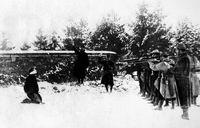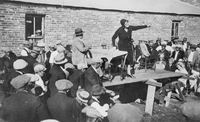Seeds of Fire: A People’s Chronology
Recalling events that happened on this day in history.
Memories of struggle, resistance and persistence.
Compiled by Ulli Diemer
|
September 1843
|

|
|
Karl Marx writes a letter to Arnold Ruge sketching out his vision of the socialist publishing project they have been discussing. Marx writes “Constructing the future and settling everything for all times are not our affair; it is all the more clear what we have to accomplish at present: I am referring to ruthless criticism of all that exists, ruthless both in the sense of not being afraid of the results it arrives at and in the sense of being just as little afraid of conflict with the powers that be. Therefore I am not in favour of raising any dogmatic banner.”
|
|
September 1873
|
|
|
The U.S. economy enters a crisis leading to a five-year depression.
|
|
September 1896
|
|
|
Start of the Leadville Miners’ Strike, in the United States, precipitated by the mine owners’ determination to crush the mineworkers’ unions, a goal in which they are ultimately successful.
|
|
September 1898
|

|
|
Publication of Rosa Luxemburg’s articles refuting Eduard Bernstein’s contention that socialism could be achieved by a slow process of gradual reforms. Luxemburg’s response was initially published as a series of articles in the Leipziger Volkszeitung, and then issued as a pamphlet under the title Social Reform or Revolution.
Luxemburg writes: “It is contrary to history to represent work for reforms as a long-drawn out revolution and revolution as a condensed series of reforms. A social transformation and a legislative reform do not differ according to their duration but according to their content... people who pronounce themselves in favour of the method of legislative reform in place of and in contradistinction to the conquest of political power and social revolution, do not really choose a more tranquil, calmer and slower road to the same goal, but a different goal. Instead of taking a stand for the establishment of a new society they take a stand for surface modifications of the old society. If we follow the political conceptions of revisionism, we arrive at the same conclusion that is reached when we follow the economic theories of revisionism. Our program becomes not the realisation of socialism, but the reform of capitalism.”
|
|
September 1906
|

|
|
U.S. forces intervene in Cuba to ‘protect American interests’ and establish a compliant government. They leave – for the time being – on January 23, 1909.
|
|
September 1917
|

|
|
A rebellious Russian division of the Russian Expeditionary Force in France, refusing to participate any longer in the ongoing slaughter, is encircled by French troops (i.e. their allies) and bombarded with cannon fire, killing 19. The leaders of the rebellion are shipped off to North Africa in penal servitude while the rest of the Russian troops (about 10,000 men) are demobilized and transferred into forced-labour battalions. This mutiny follows an earlier one in June 1917, during which a large number of French soldiers mutinied against their own commanders.
|
|
September 1931
|

|
|
Start of the Estevan Coal Miners' Strike in Saskatchewan.
|
|
September 1938
|
|
Founding Congress of the Fourth (Trotskyist) International, near Paris.
The Fourth International brought together the followers of Leon Trotsky, one of the key leaders of the Russian Revolution, who had been driven from power and expelled by Stalin. Trotsky and his followers saw themselves as representatives of the revolutionary principles of Bolshevik-Leninism that had been betrayed by Stalin.
|
|
September 1, 1939
|
|
|
Nazi Germany invades Poland, triggering the bloodiest conflict in human history. Before World War II ends, some 50 to 75 million people will die, two-thirds of them civilians.
|

